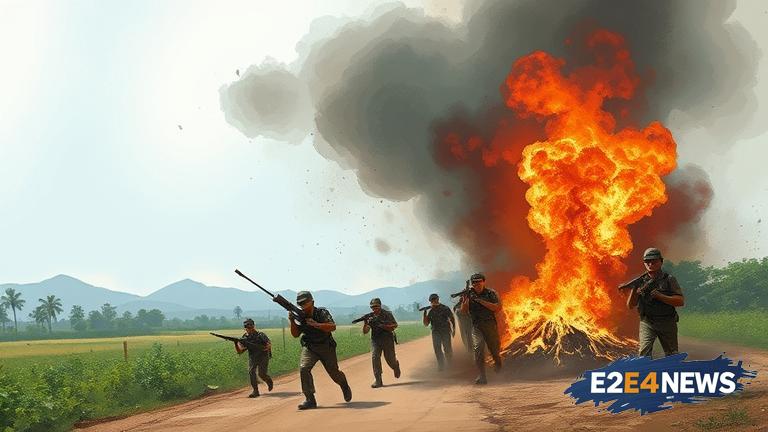The Thai-Cambodia border has witnessed a surge in clashes, with reports of exchanges of gunfire and artillery fire between the two nations. The conflict has been ongoing for several years, with both countries claiming ownership of disputed territories. The latest escalation has raised concerns among regional leaders, who fear the situation could spiral out of control. The clashes have resulted in the displacement of thousands of civilians, who have been forced to flee their homes in search of safety. The Thai military has been accused of using excessive force, leading to allegations of human rights abuses. Cambodia has also been criticized for its handling of the situation, with some accusing the government of provoking the clashes. The conflict has significant implications for the region, with trade and economic ties between the two nations likely to be affected. The Association of Southeast Asian Nations (ASEAN) has called for calm and restraint, urging both sides to engage in dialogue to resolve the dispute. The United States and other Western nations have also weighed in, calling for a peaceful resolution to the conflict. Despite the international pressure, the situation on the ground remains tense, with both sides dug in and refusing to back down. The Thai government has insisted that it will defend its sovereignty and territorial integrity, while Cambodia has vowed to protect its citizens and interests. The conflict has also sparked a nationalist fervor in both countries, with many calling for military action to resolve the dispute. The situation is further complicated by the presence of ancient temples and other cultural artifacts in the disputed territories, which are claimed by both sides. The International Court of Justice has previously ruled on the dispute, but the decision has been rejected by Thailand. The conflict has significant implications for the region’s stability and security, and a peaceful resolution is urgently needed. The international community must continue to pressure both sides to engage in dialogue and find a peaceful solution to the dispute. The use of force must be avoided, and all parties must work towards a negotiated settlement. The people of Thailand and Cambodia deserve peace and stability, and it is the responsibility of their leaders to deliver it. The region cannot afford another conflict, and all efforts must be made to prevent further escalation. The situation is being closely monitored by regional and international leaders, who are urging calm and restraint. The Thai and Cambodian governments must put the interests of their people first and work towards a peaceful resolution. The conflict is a reminder of the need for strong regional institutions and mechanisms for resolving disputes peacefully. The ASEAN framework provides a useful platform for dialogue and cooperation, and must be utilized to find a solution to the conflict. The international community must also provide support and assistance to help resolve the dispute and promote regional stability.
